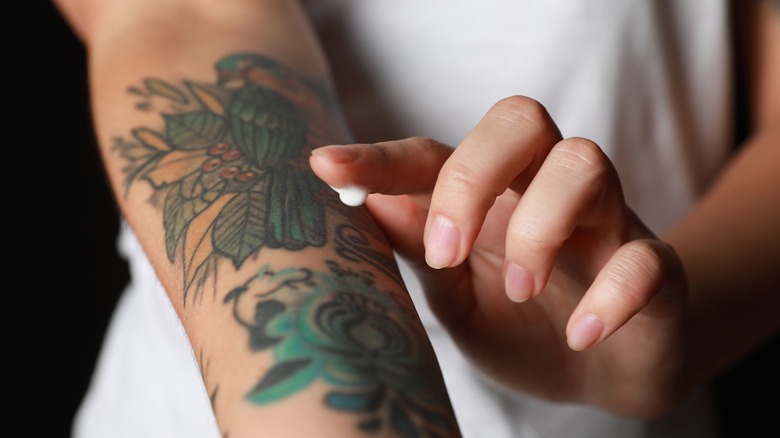If You Think Your Tattoo Is Infected, This Is When You Should See A Doctor
The art of tattooing has been around for more than 5,000 years, according to McGill University. Cultures from all over the world used tattoos to create marks of personal protection, illustrate their beliefs, or mark criminals. This ancient practice has evolved over the centuries, becoming more of a fashion statement.
Psychology Today estimates that nearly 40% of young adults have one or more tattoos. In a survey, about 25% of those who got inked said they saw it as a way to honor their loved ones or mark important moments in their lives. But despite its popularity, tattooing carries certain risks and may not be safe for everyone.
For example, some people can develop allergic reactions to tattoo ink — even years after getting a tattoo. There's also a risk of hepatitis, skin infections, or scarring, warns Middlesex Health. Estimates indicate that up to 6% of those who get inked experience an infection, notes a 2016 review published in Deutsches Ärzteblatt International. Most infections are caused by Pseudomonas aeruginosa, Staphylococcus aureus, and other bacterial species, including antibiotic-resistant germs.
Without proper treatment, bacterial infections can lead to tissue death, abscesses, papules, or more severe complications, such as sepsis and pneumonia. The infection may also spread to the heart or other vital organs, according to the above review. With that in mind, it's important to see a doctor sooner rather than later if your tattoo becomes infected.
Call your doctor if you notice these signs of infection
Infected tattoos are relatively common, and some can be treated at home. Typical signs of infection include pain and redness at the tattoo site, itchy bumps, pus, fever, or open sores. According to the American Academy of Dermatology Association (AAD), these symptoms can occur immediately after getting a tattoo or later on. While it's normal to experience soreness and itching around a new tattoo, an infection will cause more severe reactions.
The AAD recommends seeing a doctor if you notice any signs of infection at the tattoo site. However, minor infections don't always require treatment. In such cases, it may be enough to wash the affected area with antibacterial soap, suggests dermatologist Susan Massick (via The Ohio State University). If you see reddish sores around your tattoo, keep the area clean and use an antibiotic ointment. In more severe cases, your doctor may prescribe oral antibiotics.
Dr. Massick says it's important to seek medical care if you have a fever, chills, severe pain and swelling, or foul-smelling pus. "If you experience spreading pink discoloration or the feeling of pulsatile heat radiating from around your tattoo, you may have an infection," dermatologist Dr. Viseslav Tonkovic-Capin tells Men's Health. These symptoms may occur without an infection, but you should call your doctor if they last longer than three days. Also, contact a dermatologist if you see a red, swollen bump at the tattoo site, which may indicate an infection with non-tuberculosis mycobacterium.


